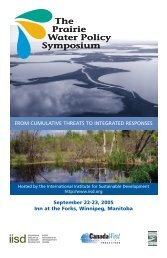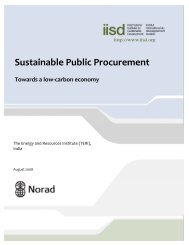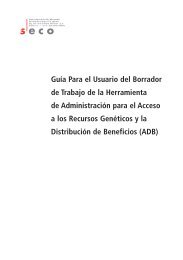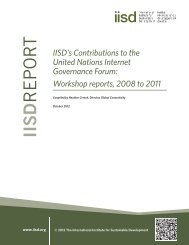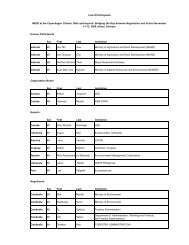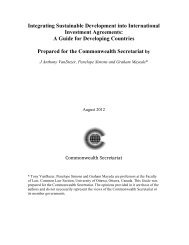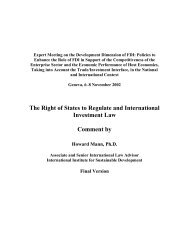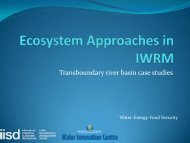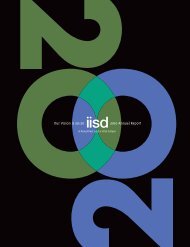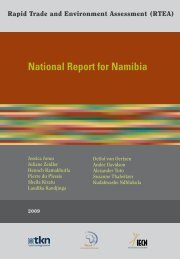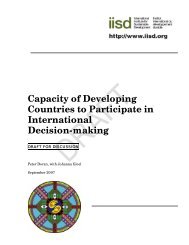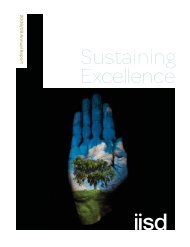Sustainable Development Impacts of Investment Incentives: A Case ...
Sustainable Development Impacts of Investment Incentives: A Case ...
Sustainable Development Impacts of Investment Incentives: A Case ...
Create successful ePaper yourself
Turn your PDF publications into a flip-book with our unique Google optimized e-Paper software.
trade knowledge network<br />
products and regions. In terms <strong>of</strong> tax incentives, there are few regulations, for example Government<br />
Regulation No. 45/1996 on Income Tax on Obligatory Tax Income for Specified Business Industry;<br />
Government Regulation No. 147/2000 on Tax Treatment in Integrated Regional Economic<br />
<strong>Development</strong> Zones (KAPET); Government Regulation No. 148/2000 on Corporate Taxes Facilities<br />
for <strong>Investment</strong> in Specified Business Sectors and/or Specified Regions; Government Regulation No.<br />
12/2001 on Import and/or Delivery <strong>of</strong> Taxable Specified Goods Strategic in Nature Exempt from Value<br />
Added Tax; and Government Regulation No. 1/2007 on Corporate Tax Facilities for <strong>Investment</strong>s in<br />
Specified Business Sectors and/or Specified Regions.<br />
Government Regulation No. 1/2007 replaced Government Regulation No. 148/2000, which faced<br />
implementation hurdles as there were presidential decrees issued to regulate specified sectors and/or<br />
specified regions granted such facilities. Government Regulation No.1/2007 <strong>of</strong>fers income tax<br />
dispensation facilities to 15 sectors, one <strong>of</strong> which is the chemical industry (both inorganic and organic).<br />
The pharmaceutical industry is one <strong>of</strong> the other chemical industries that was granted the facility. The<br />
incentive is strongly related to the petrochemical industry, one <strong>of</strong> the strategic industries in the<br />
Manufacturing Industry <strong>Development</strong> Blueprint in Indonesia Year 2007 by Ministry <strong>of</strong> Industry.<br />
The blueprint states that the chemical industry development strategy encompasses many things, for<br />
example cluster location development (i.e., Kalimantan, Tuban and Cilegon), while strategies to achieve<br />
supporting investment and business climates are implemented through fiscal, monetary and<br />
administration incentives, including legal and safety guarantees. The fiscal incentives in particular are<br />
promoted through tax incentive policies.<br />
Other laws enacted to support the investment regime include Law No. 40/2007 on Limited Liability<br />
Companies; Presidential Regulation No. 76/2007 on the Formulation Criteria and Requirement <strong>of</strong> List<br />
<strong>of</strong> Lines <strong>of</strong> Businesses Closed and Open, Conditional to <strong>Investment</strong>; Presidential Regulation No.<br />
111/2007 on the Amendment <strong>of</strong> Presidential Regulation No. 77/2007 on The List <strong>of</strong> Lines <strong>of</strong> Businesses<br />
Closed and Open with Conditions to <strong>Investment</strong>; Government Regulation No. 7/2007 on the Import<br />
and/or Transfer <strong>of</strong> Strategic Certain Taxable Items, which include the Value Added Tax Exemption.<br />
3 Bilateral and Multilateral <strong>Investment</strong> Treaties and<br />
Negotiations<br />
3.1 Bilateral agreements<br />
The Government <strong>of</strong> Indonesia has signed bilateral investment treaties (BITs) with other countries under<br />
investment guarantee agreements (IGA). By signing an IGA, the government guarantees both<br />
compensation and transfer <strong>of</strong> losses that occur as a consequence <strong>of</strong> wars and other armed conflicts,<br />
revolutions, states <strong>of</strong> national emergency, revolts, insurrections or riots. The number <strong>of</strong> agreements<br />
signed has increased gradually from 33 in 1996 to 61 in 2006. The latest countries to sign were Japan<br />
and Russia in 2007, bringing the total IGAs signed by Indonesia to date to 63. 3 On April 16, 2008,<br />
Indonesia agreed to begin bilateral investment treaty negotiations with Canada under Foreign<br />
<strong>Investment</strong> Promotion and Protection Agreement (FIPA).<br />
3 These countries include Argentina, Australia, Bangladesh, Belgium, Cambodia, Chile, Cuba, Czech Republic, Denmark, Egypt,<br />
Finland, France, Germany, Hungary, India, Italy, Jamaica, Jordan, Kyrgyzstan, Laos, Malaysia, Mauritius, Mongolia, Morocco,<br />
Mozambique, North Korea, Norway, Pakistan, People’s Republic <strong>of</strong> China, Poland, Qatar, Romania, Singapore, Slovak Republic,<br />
South Korea, Spain, Sri Lanka, Sudan, Suriname, Syria, Sweden, Switzerland, Thailand, The Netherlands, Tunisia, Turkey,<br />
Turkmenistan, Ukraine, United Kingdom, Uzbekistan, Vietnam, Yemen and Zimbabwe.<br />
<strong>Sustainable</strong> <strong>Development</strong> <strong>Impacts</strong> <strong>of</strong> <strong>Investment</strong> <strong>Incentives</strong>: A <strong>Case</strong> Study <strong>of</strong> the Chemical Industry in Indonesia<br />
7



